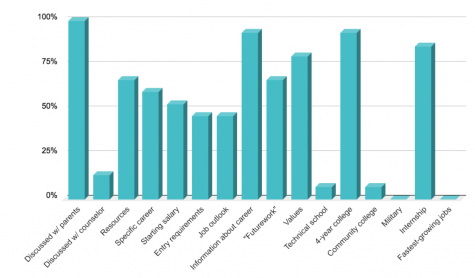Looking Toward the Future
November 15, 2020
Exactly how future-orientated are the students in Lower Moreland? To answer this question, I surveyed 15 students grades nine through twelve. I asked them a variety of questions about their post high-school plans and about what they have done so far to prepare themselves for the future. The survey included questions such as whether the individual knew what values to look for in a career and if they knew their career outlook. The results are shown in the chart below.

None of the students correctly identified all three of the fastest growing occupations, yet one student was able to name two. In addition, an overwhelming majority of students (93.3%) responded that they would go to college after high school as opposed to the military (0%), technical school (6.7%), or a community college (6.7%). This information correlates to what I heard when I interviewed Mrs. Specht, one of the guidance counselors at Lower Moreland. She said that 85% of all students graduating LM attend a four-year college, 11% go to a two-year school, community college, or technical school, and the other 4% serve in the military or find employment right away.
This data begs the question, “Is it ingrained in individuals that college is the only option?” To explore this question, students were given a follow-up survey asking if there was any outside pressure on them to choose this path. The popular answer was that there was definitely some pressure, but that ultimately it was their decision, and that the main force behind this response was that their career plans required a four-year degree.
The majority of individuals knew their sense of self, as shown by the 80% of individuals who responded that they knew the values they were looking for in a career and the 60% that knew their dream career. Though most students knew the specific career they wanted to pursue, only 46.7% understood the entry requirements for their choice. “I plan to attend a four year college to learn civil engineering,” said one student, but when asked about the job outlook or entry requirements, no response could be given. This was a common situation throughout the survey. One student, however, replied that he knew most aspects of his future career, and he plans to “study bio in college and, from there, attend the first 2 years of medical school. After those 2 years, rotations begin and I will decide what kind of doctor I would like to become.”
Overall, the data collected from this survey indicates that though students have a strong sense of what they want to do in the future, many do not use the resources available for them to find out key information about their career choices. 80% of participants responded that they knew where to find educational and career resources, yet 90% have not spoken with a guidance counselor about their plans. By getting in touch with their guidance counselors, LM students can better prepare themselves for their future careers.